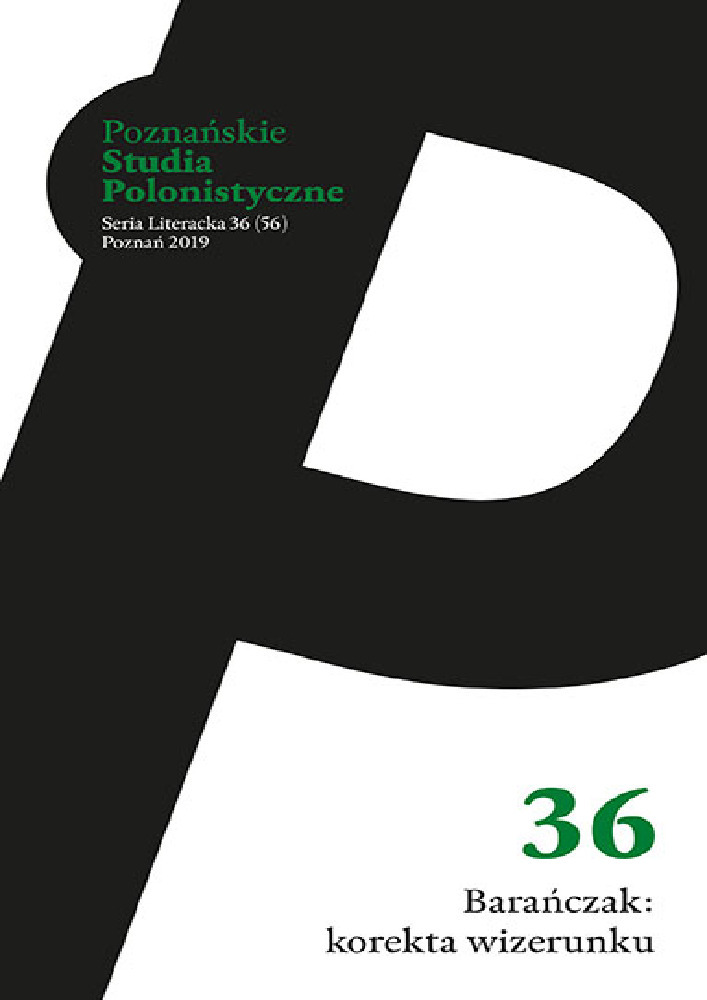Abstract
The outline discusses Stanisław Barańczak’s fascination with Witold Wirpsza’s works. Its clearest symptom was his infection with Wirpsza’s ‘stylistic tissue’, which is something Barańczak himself admitted. This infection is clearly visible in the first three collections: Facial Corrections (Korekta twarzy), Without Stopping for Breath (Jednym tchem) and Morning Journal (Dziennik poranny). The key sources of references and inspirations for these collections were Wirpsza’s poems from the collection Superstitions (Przesądy) and the digressional poem Faeton. The article demonstrates how Stanisław Barańczak presents the readers with a specific ‘key to Wirpsza’ in his works of literary criticism. According to the author of The Diffident and the Proud (Nieufni i zadufani), literary criticism was unable to cope with Wirpsza. What pushed the young poet from Poznan to remodel the reading of Wirpsza’s poetry and to make significant changes to contemporary poetic tendencies was the collection Superstitions (Przesądy) published by
Wirpsza in 1966, one year after his essay collection Game of Meaning (Gra znaczeń). Barańczak assigned Wirpsza to the language poetry movement. In his later accounts of reading, Barańczak the critic suggested that there was a ‘deep gap’ between Wirpsza’s achievements from various periods of his work. He claimed that Wirpsza was first a political poet, and he wanted to perceive the later stages of the life of the ‘poet-idol’, generally, as undergoing ‘rapid and dramatic changes’: one of the socialist realist poets, experimenter, a difficult poet, original theoretician accused of creating ‘art for art’s sake’ and ‘excessive hermeticism’ and finally an ‘emigrant’ who turned out to be a political writer, only to become, finally and unexpectedly, a religious poet.
References
Barańczak Stanisław (1967a), Nieufni i zadufani. Rzecz o walce romantyków z klasykami w poezji najmłodszej, „Nurt”, nr 10, s. 14-19.
Barańczak Stanisław (1967b), „Pisane w karnawale”, „Nurt”, nr 6, s. 43-44.
Barańczak Stanisław (1971a), Nieufni i zadufani. Romantyzm i klasycyzm w młodej poezji lat sześćdziesiątych, Ossolineum, Wrocław.
Barańczak Stanisław (1971b), Oczy Lizawiety Prokofiewny, „Odra”, nr 6, s. 31-38.
Barańczak Stanisław (1979), Na 60-lecie Witolda Wirpszy, „Kultura”, nr 1, s. 102-107.
Barańczak Stanisław (1985), Śledztwo w sprawie Boga, „Kultura”, nr 7-8, s. 183-187.
Barańczak Stanisław (1995), Pegaz zdębiał. Poezja nonsensu a życie codzienne: wprowadzenie w prywatną teorię gatunków, Puls, Londyn [Wielka Brytania].
Barańczak Stanisław (2016), Język poetycki Mirona Białoszewskiego, oprac. i posłowie Adam Poprawa, Ossolineum, Wrocław.
Lipski Jan Józef (1967), Autotematyzm, ekspresja i koncept, „Twórczość”, nr 12, s. 112-114.
Man Paul de (2000), Pojęcie ironii, w: tegoż, Ideologia estetyczna, wstęp Andrzej Warmiński, przeł. Artur Przybysławski, Słowo/obraz terytoria, Gdańsk, s. 251-281.
Matuszewski Ryszard (1968), Liryka. Poemat, „Rocznik Literacki [1966]”, s. 37-39.
Pawelec Dariusz (2013), Wirpsza wielokrotnie, Instytut Mikołowski, Mikołów.
Pawelec Dariusz (2014), Wirpsza Stanisława Barańczaka, w: Poeta i duch wolności. Szkice o twórczości Stanisława Barańczaka, red. Piotr Śliwiński, WBPiCAK, Poznań, s. 111-116.
Sokół Lech (1967), Konstruuję, więc jestem, „Poezja”, nr 8, s. 87-88.
Wiedemann Adam (1996), Księżyc nad Alabamą, „Odra”, nr 9, s. 121-122.
Wiedemann Adam (1998), Witold Wirpsza – poeta trzydziestoletni, FA-art, nr 1-2, s. 4-6.
Wirpsza Witold (1995), Nowy podręcznik wydajnego zażywania narkotyków, A5, Poznań.
Wirpsza Witold (2006), Liturgia, Instytut Mikołowski, Mikołów.
Wirpsza Witold, Kunstmann Heinrich (2015), “Salut Henri! Don Witoldo!”. Witold Wirpsza – Heinrich Kunstmann. Listy 1960-1983, oprac. Dorota Cygan, Marek Zybura, Universitas, Kraków.
Wirpsza Witold (2017), Sama niewinność. Powieść, oprac. i wstęp Dariusz Pawelec, Instytut Mikołowski, Mikołów.
Witan Jan (1967), Wśród poetów, „Nowe Książki”, nr 8, s. 460-464.
Wyka Marta (1967), Poeta – filozof, „Życie Literackie”, nr 34, s. 10.
License
Authors
Authors of texts accepted for publication in „Poznańskie Studia Polonistyczne. Seria Literacka” are required to complete, sign and return to the editor's office the Agreement for granting a royalty-free license to works with a commitment to grant a CC sub-license.
Under the agreement, the authors of texts published in „Poznańskie Studia Polonistyczne. Seria Literacka” grant the Adam Mickiewicz University in Poznań a non-exclusive, royalty-free license and authorize the use of Attribution-NoDerivatives 4.0 International (CC BY-ND 4.0)Creative Commons sub-license.
The authors retain the right to continue the free disposal of the work.
Users
Interested Internet users are entitled to use works published in „Poznańskie Studia Polonistyczne. Seria Literacka” since 2016, for non-commercial purposes only, under the following conditions:
- attribution - obligation to provide, together with the distributed work, information about the authorship, title, source (link to the original work, DOI) and the license itself.
- no derivatives - the work must be preserved in its original form, without the author's consent it is not possible to distribute the modified work, such as translations, publications, etc.
Copyrights are reserved for all texts published before 2016.
Miscellaneous
Adam Mickiewicz University in Poznań retains the right to magazines as a whole (layout, graphic form, title, cover design, logo etc.).
